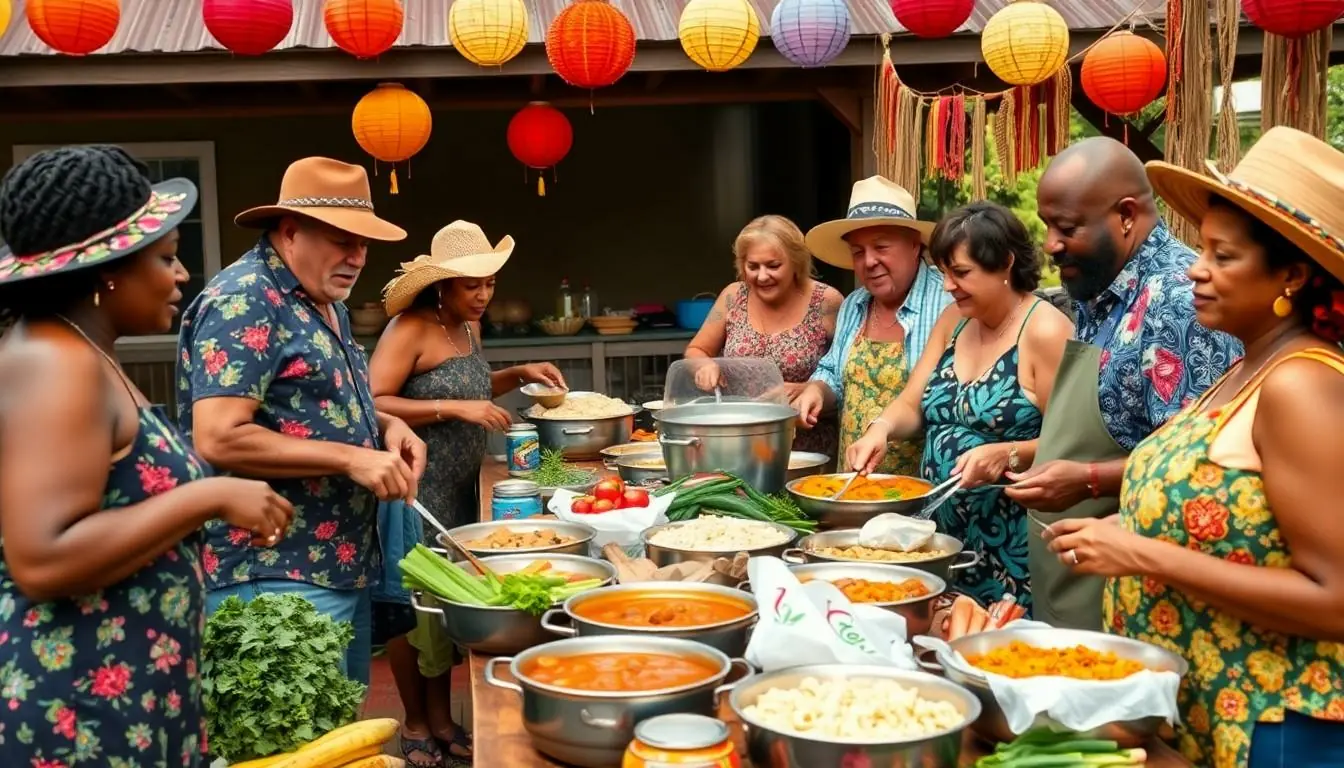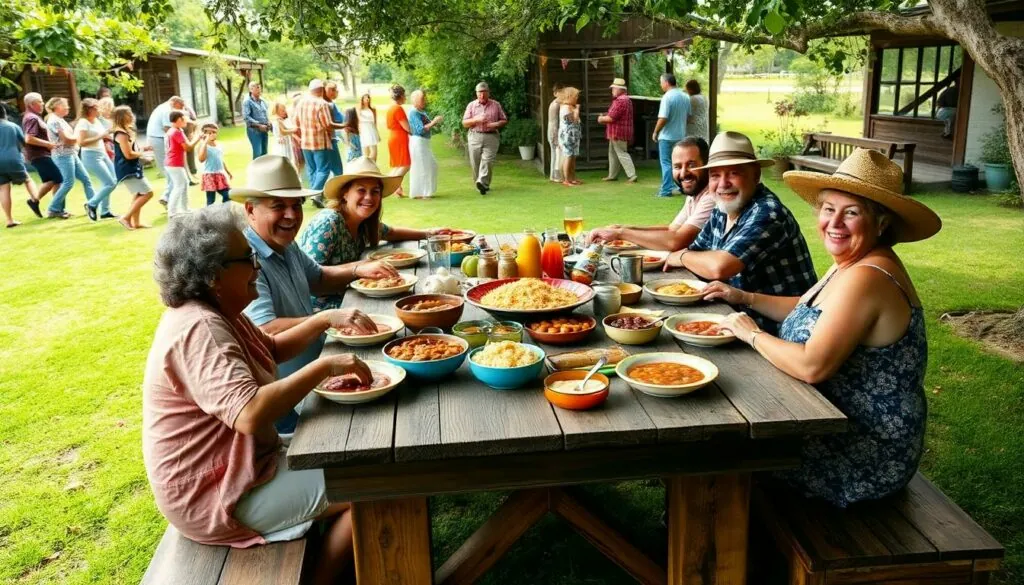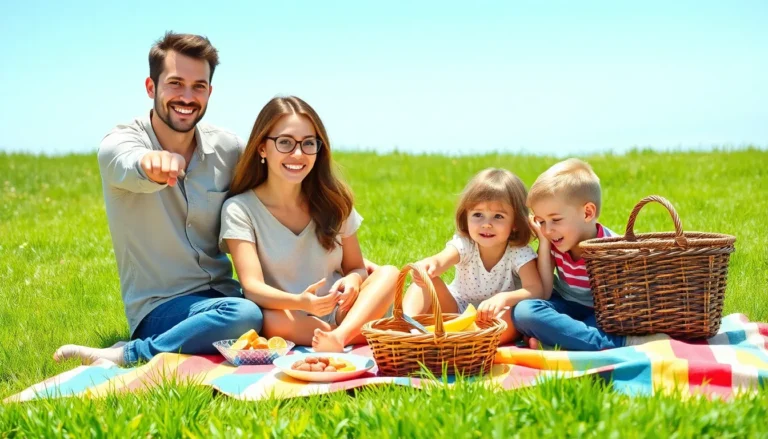Table of Contents
ToggleCajun family traditions are like a spicy gumbo—rich, flavorful, and full of surprises. They blend history, culture, and a whole lot of love, creating a tapestry that binds generations together. From lively gatherings around the dinner table to spirited celebrations that last into the night, these traditions offer a taste of the vibrant lifestyle that defines Cajun culture.
Imagine the aroma of jambalaya wafting through the air as laughter fills the room. Each family recipe tells a story, passed down like a cherished heirloom. Whether it’s dancing the two-step or sharing tales of the bayou, Cajun traditions remind us that family is everything. So, grab your fork and get ready to dive into the heartwarming world of Cajun customs—where every meal is a feast and every moment is a memory waiting to be made.
Cajun Family Traditions
Cajun family traditions reflect a unique cultural heritage, deeply rooted in Louisiana’s Creole and Acadian influences. Gathering for meals forms a cornerstone of these traditions. Families converge for Sunday dinners, sharing dishes like gumbo, jambalaya, and étouffée. These meals foster connection and create cherished memories.
Storytelling plays a significant role in Cajun culture as well. Elders pass down tales of their ancestors, adventures, and lessons learned, often filled with humor and wisdom. Each story reinforces family ties and instills values in younger generations.
Music and dance also pulse through Cajun life. Events known as fais do-dos bring families together to celebrate with live Cajun music, promoting a lively atmosphere. Dancing creates joyful moments, strengthening community bonds.
In celebrating holidays, such as Mardi Gras, families engage in vibrant traditions and festivities. They don colorful costumes, partake in lively parades, and enjoy traditional foods. These events highlight the importance of community, further enhancing familial connections.
Family roles in Cajun culture emphasize respect and support. Children learn to value their elders while participating actively in family gatherings, ensuring traditions endure. The sense of unity cultivates pride in their heritage.
Cajun family traditions weave together diverse elements, forming a rich tapestry of experiences, stories, and values that individuals carry throughout their lives. Embracing these traditions allows for a deeper understanding of the Cajun way of life.
Cultural Heritage

Cajun family traditions form a rich tapestry of cultural heritage that reflects survival, resilience, and communal spirit. These traditions nourish relationships, encourage shared experiences, and foster deep-rooted connections among families.
Historical Background
Cajun culture stems from the Acadian exiles who settled in Louisiana during the 18th century. Their arrival introduced a blend of French, Spanish, and African influences, shaping a unique identity. This historical migration led to the formation of distinct practices and traditions, influenced by both hardship and adaptation. Elements such as language, music, and cuisine emerged from these roots, uniting families through shared stories of struggle and success. Generations carry these narratives, ensuring that cultural heritage remains vibrant and accessible to younger family members.
Influences on Cajun Culture
Numerous factors shape Cajun culture, creating a diverse mosaic that resonates within homes. The interaction with indigenous tribes, such as the Chitimacha and Tunica, enriched agricultural and culinary practices. French Colonial heritage remains a key influence, reflected in language and celebrated festivals. African American culture contributes rhythm to music and dance, enhancing communal gatherings. Additionally, Spanish and Creole interactions added variations in cuisine, fostering rich culinary traditions like gumbo and jambalaya. Together, these influences create a dynamic cultural heritage that nourishes family bonds and community ties.
Culinary Traditions
Cajun family culinary traditions offer a delightful mix of bold flavors and community togetherness. These practices celebrate the unique cultural heritage of Louisiana, emphasizing the importance of shared meals and cooking techniques passed down through generations.
Signature Dishes
Gumbo stands out as a quintessential Cajun dish, featuring a savory broth loaded with shrimp, sausage, and okra. Jambalaya combines rice with an array of meats, showcasing the fusion of flavors that’s characteristic of Cajun cuisine. Étouffée, a rich dish typically made with crawfish and a dark roux, highlights the technique of layering flavors. Red beans and rice, often cooked on Mondays using leftover meats, remains a staple in many households. Family recipes for these dishes often differ, highlighting the unique touch each cook adds to traditional meals.
Cooking Methods
Slow cooking plays a vital role in Cajun culinary traditions. The process enhances flavors, allowing ingredients to meld and develop depth. Techniques like sautéing and braising are often used to create rich, satisfying dishes. Roux, a mixture of flour and fat, serves as the foundation for many sauces and soups, showcasing the importance of this cooking method in Cajun cuisine. Outdoor cooking methods, such as using a large pot over an open flame, remain popular during family gatherings, fostering an environment of sharing and connection. Each method reflects the community spirit and cultural heritage embedded in Cajun traditions.
Festivities and Celebrations
Cajun family traditions come to life through vibrant festivities and celebrations. These gatherings embody culture and community, uniting families in joyous occasions.
Annual Events
Annual events mark significant moments in Cajun culture. Mardi Gras stands out with colorful parades, lively music, and intricate costumes. Families celebrate together, showcasing their unique heritage. Crawfish boils gather people around the table, where laughter fills the air. Each dish, prepared with care, reflects culinary artistry. Additionally, festivals honoring local traditions, like the Breaux Bridge Crawfish Festival, allow families to bond over shared experiences. These events foster connections and create lasting memories, enriching the cultural fabric of Cajun life.
Family Gatherings
Family gatherings play a crucial role in Cajun traditions. Regular Sunday dinners serve as a cornerstone, with communal meals featuring gumbo and jambalaya. Elders share stories that pass down history and values, reinforcing ties. Kids eagerly listen, absorbing lessons that shape their identities. Outdoor activities like fishing and hunting also encourage togetherness. Celebrations, such as birthdays and anniversaries, unite families, wrapping them in warmth and love. Music and dance often accompany these occasions, bringing everyone closer through shared joy and rhythm.
Value of Family
Cajun families place immense value on their connections, nurturing relationships that transcend generations. Strong intergenerational bonds form the backbone of these families, ensuring that children grow up with a sense of belonging.
Intergenerational Bonds
Elders play a crucial role in Cajun families, imparting wisdom to younger members. Grandparents often share experiences that shape identity and values. These relationships foster respect, allowing traditions to thrive as younger generations learn from their ancestors. Family gatherings emphasize cohesive learning, offering opportunities for shared activities that build lasting memories. Activity-filled weekends unite family members across various age groups, reinforcing the importance of togetherness in keeping cultural heritage alive.
Storytelling and Folklore
Storytelling serves as a vital component of Cajun traditions, conveying history and values through engaging narratives. Elders recount tales filled with local folklore, connecting younger generations to their roots. These narratives preserve cultural identities while highlighting resilience and community spirit. Family members gather around, captivated by tales of past struggles and triumphs. Festivals and gatherings often feature storytelling sessions, enhancing bonds among relatives. This practice not only entertains but also educates, ensuring that future generations carry forward the essence of Cajun heritage.
Cajun family traditions embody a vibrant tapestry of history and culture that unites generations. Through shared meals storytelling and joyous celebrations families create bonds that deepen their sense of belonging. The culinary practices and lively festivities not only preserve Cajun heritage but also foster a spirit of togetherness that resonates throughout the community. As these traditions continue to thrive they ensure that the rich legacy of Cajun culture remains alive for future generations. By cherishing these customs Cajun families celebrate their unique identity while passing down invaluable lessons of resilience love and connection.







